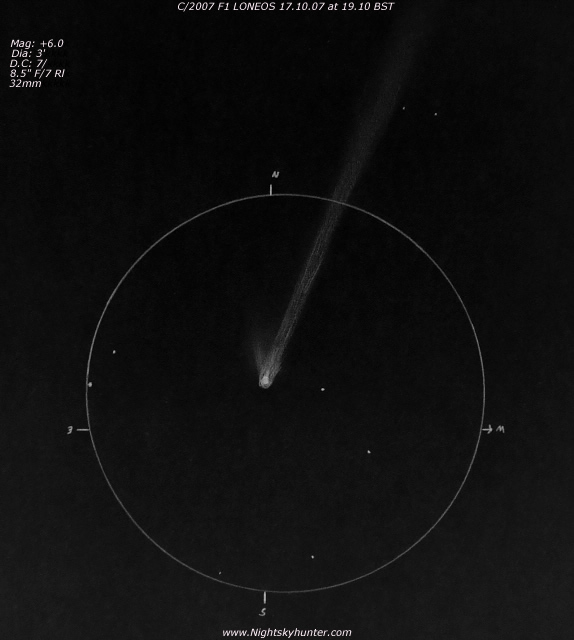BACK
C/2007 F1 LONEOS
 |
Despite a poor sky with cloud, haze and chimney smoke along with a developing frost the sky cleared from the west on Oct 17/18th and I found the comet extremely quickly at 19.10 BST to the west and slightly south of Arcturus in the darkening evening twilight.
The coma was thin, compact, very well condensed with clearly defined edges where the coma meets the sky. It was wrapped tightly around a large white disk-like central condensation with a tear drop appendage from which a long spine ran into the tail. The coma was elongated away from the Sun and sported several fanning streamers similar in profile to a 'shuttle cock'. The coma was a white-grey tone however no green could be seen.
The ion tail was blue, very straight, extending for 1 degree to the W of N and broadened with distance away from the Sun. Delicate long blue streamers could be glimpsed in fleeting moments of good clarity. I suspect the tail is MUCH longer than this. I was able to confirm something I have suspected since the morning of the 16th - a faint dust tail visible to the E of N leaving at a shallow angle from the coma perhaps 5' long. The leading sunward edge of this tail is the brightest component. It will be interesting to watch its development. This is my best evening view of the comet to date.
Lost the comet to cloud so I did a little deep sky work then watched the waxing crescent Moon with earthshine set over the mountains with compact orange corona and long but faint pillar. For icing on the cake a V-shaped formation of geese flow overhead calling as they headed to the NE with bellies and wings lit orange from the town lights!.
Mag+ 6.0 Dia: 3' D.C: 7/